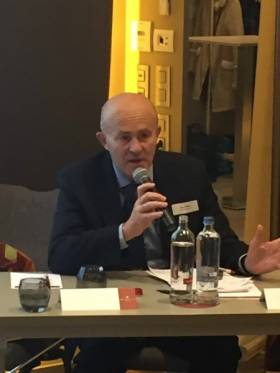Displaying items by tag: New ESPO Chairman
European Sea Ports Organisation Elect Eamonn O’Reilly As New Chairman
#NewEPSOchairman - At the European Sea Ports Organisation (ESPO) General Assembly held in Brussels Eamon O’Reilly was unanimously elected as Chairman following a vote held yesteray. O'Reilly succeeds Santiago Garcia-Mila who chaired the organisation during the last four years.
The General Assembly also elected Annaleena Mäkilä and Bernard Mazuel as Vice-Chairs. Ms Mäkilä, who is currently Executive Director of the Finnish ports Association now starts a second term in that role. Mr Mazuel is Managing Director of the French Ports Association.
Upon his election, Mr O’ Reilly said: “I am very honoured to have been elected as Chairman of ESPO for the next two years. Over these years, ports will be challenged by the implementation of the Port Regulation and other legislative initiatives. There will also be a continuing need for ports to plan and finance major infrastructure investment at the key nodes of Europe’s transport networks. Overarching these challenges, however, is the global problem of climate change and how our industry plays its part in addressing this enormous issue.
“I would like to thank the Members of ESPO for putting their trust in me and I look forward to working with Isabelle and her excellent team as we represent the interests of Europe’s ports in our response to these challenges in the years ahead.”
Mr. O’Reilly has been serving as Chief Executive of the Dublin Port Company since 2010.
Today, ESPO has also published its Annual Report 2015-2016, which outlines the activities of the organisation over the past year. A copy of the report can be found here.
In addition, tonight will see the celebration of the 8th annual ESPO Award on Societal integration. The theme of this year is nature in ports. European Transport Commissioner Violeta Bulc will be announcing the winner at a ceremony taking place at the Palais d’Egmont in Brussels.





























































